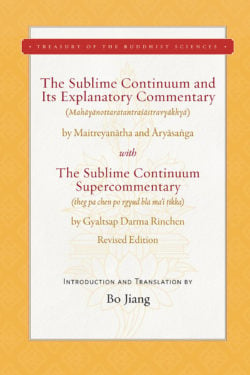Bo Jiang

Bo Jiang is a research fellow at the American Institute of Buddhist Studies at the Columbia University Center for Buddhist Studies.
Books, Courses & Podcasts
The Sublime Continuum and Its Explanatory Commentary
The original Sublime Continuum Explanatory Commentary was written by Noble Asanga to explain the verses received from the bodhisattva Maitreya in the late fourth century CE in northern India. Here it is introduced and presented in an original translation from Sanskrit and Tibetan, with the translation of an extensive Tibetan Supercommentary by Gyaltsap Darma Rinchen (1364–1432), whose work closely followed the view of his teacher, Tsong Khapa (1357–1419).
Contemporary scholars have widely misunderstood the Buddhist Centrist (Madhyamaka) teaching of emptiness, or selflessness, as either a form of nihilism or a radical skepticism. Yet Buddhist philosophers from Nagarjuna on have shown that the negation of intrinsic reality, when accurately understood, affirms the supreme value of relative realities. Gyaltsap Darma Rinchen, in his Supercommentary, elucidates a highly positive theory of buddha nature, showing how the wisdom of emptiness empowers the compassionate life of the enlightened, as it is touched by its oneness with the truth body of all buddhas. With his clear study of Gyaltsap’s insight and his original English translation, Bo Jiang completes his historic project of studying and presenting these works from Sanskrit and Tibetan in both Chinese and, now, English translations, in linked publications.

